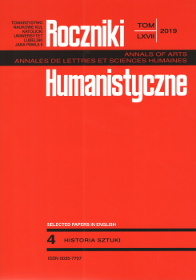What the Polish Mother Does Not Say. Zbylut Grzywacz Against the Myth
Abstract
The Polish version of the article was published in Roczniki Humanistyczne vol. 62, issue 4 (2014).
The article presents the art of Zbylut Grzywacz in the context of his post-mortem exhibition in the Kraków National Museum in 2009. The subjects of the analysis are his paintings from the 1970s and 1980s, presenting women through a simple rough treatment of human body form, without an academic idealization. The destruction of the form conforms to the deconstruction of the myth of a Polish Mother. It is due to the change of a social position of the figures whom Grzywacz gives the roles of guardians of tradition, as well as due to their mental and moral degradation. The artist uses an irony in showing his knowledge of the tradition of showing a human body in an academic nude (what he denies), in a Flemish art of showing torn animal meat (with the Rembrandt’s reflection) and Holbein’s tradition of the post-mortem decay (The Body of the Dead Christ in the Tomb). One of the main themes in Grzywacz’s paintings is the loneliness, especially distinct in a representation of symbolically naked persons among insensible pedestrians. The Polish Mother—here she doesn’t belong to any society.
The explicitness and the picturesque materiality covers a certain “crack” in the world presented inside the hard-to-comprehend present-day multitude of Grzywacz’s paintings. Behind the cover of the foreground tale, as one could think on the basis of the sketchbooks, there is a kind of an “unpresented world”, in which the author incessantly tells us about the pain of his existence with no anaesthetization by grotesque.
References
Artysta wobec siebie i społeczeństwa—twórczość Zbyluta Grzywacza i jej konteksty, ed. Joanna Boniecka. Kraków: Muzeum Narodowe w Krakowie, 2010.
Bałus, Wojciech. “Pomoc Zbulyta Grzywacza. Albo o metaforze i metonimii w ‘czasie marnym’.” In Artysta wobec siebie i społeczeństwa—twórczość Zbyluta Grzywacza i jej konteksty, ed. Joanna Boniecka, 205–218. Kraków: Muzeum Narodowe w Krakowie, 2010.
Boniecka, Joanna. “Wstęp.” In Artysta wobec siebie i społeczeństwa—twórczość Zbyluta Grzywacza i jej konteksty, ed. Joanna Boniecka. Kraków: Muzeum Narodowe w Krakowie, 2010.
Boniecka, Joanna. “Zbyluta Grzywacza rozmowa z mistrzami na przykładzie obrazu ‘Kolejka (Siedem etapów z życia kobiety)’.” In Joanna Boniecka. Zbylut Grzywacz 1939–2004, 307–325. Kraków: Muzeum Narodowe, 2009.
Cieśla-Korytowska, Maria. “Hic mulier? O mężnych kobietach romantyzmu.” In Persefona, czyli dwie strony rzeczywistości, ed. Maria Cieśla-Korytowka, Małgorzata Sokalska, 321–246. Kraków: Wydawnictwo UJ, 2010.
Grzywacz, Zbylut. Memłary i inne teksty przy życiu i sztuce, selected, complied and edited by Tadeusz Nyczek. Kraków: Universitas, 2010.
Janion, Maria. Kobiety i duch inności. Warszawa: Sic!, 1996.
Janion, Maria. Niesamowita Słowiańszczyzna. Fantazmaty literatury. Kraków: Wydawnictwo Literackie, 2006.
Kitowska-Łysiak, Małgorzta. “Pomiędzy ‘realnością’ świata i ‘realizmem’ dzieła sztuki. Grupa ‘Wprost’—konteksty.” In Świat przedstawiony? O grupie „Wprost”, selected, complied and introduced by Małgorzta Kitowska-Łysiak. Lublin: TN KUL, 2006.
Kudelska, Dorota. Dukt pisma i pędzla. Biografia intelektualna Jacka Malczewskiego. Lublin: Wydawnictwo KUL, 2008.
Ostrowska, Elżbieta. “Matki polki i ich synowie. Kilka uwag o genezie obrazów kobiecości i męskości w kulturze polskiej.” In Gender. Konteksty, ed. Małgorzata Radkiewicz. Kraków: Rabid, 2004.
Prokop, Jan. “Kobieta Polka.” In Słownik literatury polskiej XIX wieku, ed. Józef Bachórz, Alina Kowalczykowa, 414–417. Wrocław: Ossolineum, 1991.
Said, Edward. Orientalizm. Warszawa: PIW, 1991.
Walc, Jan. Architekt Arki. Chotomów: Verba, 1991.
Walczewska, Sławomira. Damy, rycerze i feministki. Kobiecy dyskurs emancypacyjny w Polsce. Kraków: eFKa, 1999.
Wapiński, Roman. Polska na styku narodów i kultur. W kręgu przeobrażeń narodowościowych i cywilizacyjnych w XIX i XX wieku. Gdańsk: Stepan Design, 2002.
Copyright (c) 2019 Roczniki Humanistyczne

This work is licensed under a Creative Commons Attribution-NonCommercial-NoDerivatives 4.0 International License.





